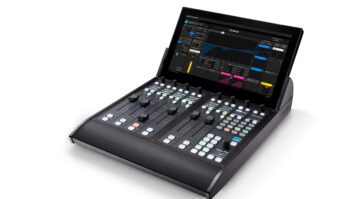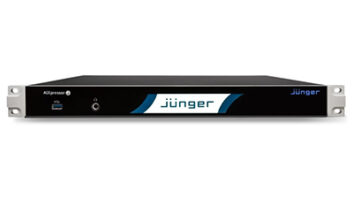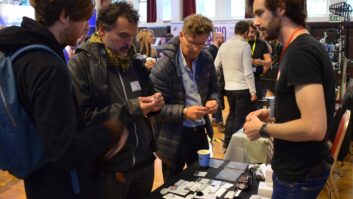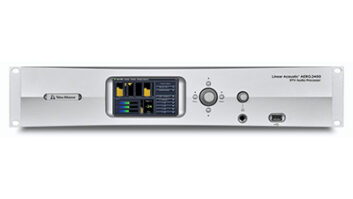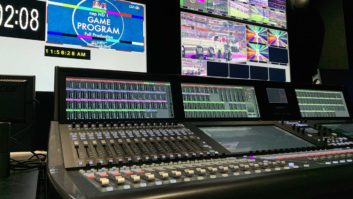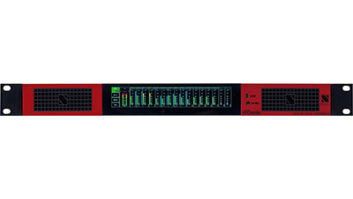London-based Advanced Broadcast Services (ABS Broadcast), one of the largest independently owned playout and television facilities companies in Europe, is using loudness control technology by Jünger Audio to deliver a better service to its international clients.
Established in 1989 by former BBC Broadcast Engineer Sass Jahani, ABS manages the transmission and technical requirements for numerous major television channels around the world. The company initially designed and implemented bespoke broadcast installations, but with the advent of the Sky Digital platform in the UK in 1998, it became a service provider and now supports the needs of more than 50 TV channels from its playout operations centre in Park Royal.
According to Mukund Patel, ABS head of technology and engineering, monitoring all incoming and outgoing services is a key part of the company’s quality control strategy.
“Controlling audio loudness is now a legal requirement in many countries around the world and, as we broadcast TV channels on an international basis, having a reliable loudness management system in place is imperative,” he explains. “Since making the decision to go with Jünger Audio’s system we haven’t looked back. When dealing with equipment manufacturers, our philosophy is usually to check out three companies, get quotes and compare the features each company’s equipment offers. Jünger Audio is the only company where we haven’t done that. We just liked their products from day one and after many years’ experience with them, we know they always work.”

ABS first made contact with Jünger Audio in 2005 when an ABS customer complained about an imbalance in the audio levels between his station’s programme content and commercials. Viewers were complaining and the customer wasn’t happy.
“Someone we knew recommended the Jünger Audio B42 leveller, so we bought one and it completely solved the problem,” Patel says. “We just plugged it in and it worked. We ended up buying quite a few more B42s to help level our audio content. Of course, the B42 doesn’t control loudness so when that became an issue we went back to Jünger Audio and started investing in the company’s C8000 system.”
Legalising loudness
Jünger Audio’s modular C8000 solution incorporates a suite of DSP and I/O interface cards enabling it to completely integrate workflow for managing surround sound and Dolby coded 5.1 audio signals in production, ingest and playout. These include HD/SDI de-embedding/embedding with VANC, Dolby E resynchronisation with in-built video delay and Dolby Metadata generation.
All C8000 systems include Jünger Audio’s Level Magic adaptive loudness algorithm, which is based on a multi-loop dynamic range control principle. This enables slow changes (AGC), fast changes (transient processing) and look ahead peak limiting to be handled simultaneously, thus offering level management with high audio quality and without colouration, pumping, breathing, distortion or modulation effects.
“When we installed our first C8000 systems we started putting two TV channels through them,” Patel says. “They were so useful that we invested in more, and are now we are up to ten channels. Because it is a modular system it is very easy to expand as we go along. We just add more cards, copy and paste the pre-sets for a particular territory and off we go.
“Initial set up was just as easy. When we first got a C8000, Jünger Audio helped us test it and install the right pre-sets. Everything we put through the C8000 is now compliant with loudness legislation in all key territories including the USA, and we don’t manually have to adjust anything.”
Going global
Of course, not every country has Loudness legislation in place, and channels broadcasting to those countries don’t need to playout through a Jünger Audio system, but Patel thinks it won’t be long before demand for loudness control laws reaches even these places – especially if the content they are producing is destined for international markets.
“If our customers want to broadcast to Europe or the US, they have to comply with legislation, otherwise they get fined,” Patel says. “We do provide loudness logging and the reports we give are very comprehensive, but provided the audio content is going through the Jünger Audio system we can be very confident that there won’t be a loudness issue. The C8000 sits towards the end of the broadcast chain and going through it is pretty much the last thing that happens to the audio before transmission.”
In recent years, ABS has expanded rapidly and is now housed in the fourth iteration of its playout facility. By strategically combining traditional broadcast practices with the latest technology and innovative thinking, ABS has pioneered many of today’s best practices in the multi-channel playout and transmission environment.
“We also take training very seriously because we feel it matters if we want to ensure excellence in our delivery of service,” Mukund Patel adds. “As part of this process we like staff to understand the technology they are using so that they know why it does what it does.”
To this end, ABS arranged a staff seminar on loudness, which was presented by Jünger Audio’s Anthony Wilkins and Chris Collings, from the company’s UK distributor Aspen Media.
“Anthony and Chris explained all about audio loudness and why it is such an issue for TV audiences,” Patel says. “They also explained what the C8000 does and how it solves the problem. We have over 30 staff now and I was delighted at the number of people who came along – some even came in on their own time because they wanted to learn.”
Although ABS has no immediate plans to add additional Jünger Audio C8000 units to its roster, Mukund Patel is in no doubt that more will be coming along eventually.
“If customers ask for loudness control, then we’ll be buying more,” he says. “It’s bound to happen – one of our customers has already said he wants loudness control on every channel so this is something we know will grow.”
